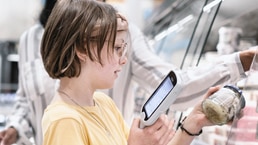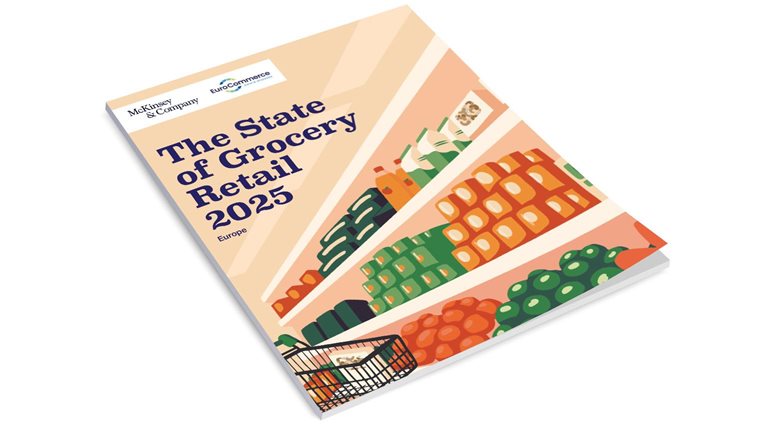This interview was conducted on February 9, 2022, and amended on March 23, 2022.
Question: How do you see the grocery retail industry evolving in the next year?
Cláudia Azevedo: I’m not sure I can make any predictions because nearly every prediction from the past two years has turned out to be wrong! And this is made worse when we have a war on Europe’s doorstep. My thoughts are with the Ukrainian people, as they are the ones who are suffering the most.
This situation severely impacts energy and food supply for families and businesses. We don’t know what course it will take. Here’s what we do know: supply chain issues will likely persist. We are aware that general price increases are a problem for families, who will need to make compromises in their budgets. We will do our best to reduce the impact of rising costs, namely in energy and food stuff, and find creative ways to secure supplies for our customers.
At the same time, there’s a huge push for sustainability from both our customers and our employees. As an industry, we know we have a huge role to play in the ecosystem: in transportation, supply chain, agriculture, and packaging. Consumers also want convenience, and we have seen the acceleration of e-commerce, digitalization, and competition from new players.
When I step back to look at the bigger picture, I see all of these trends forcing us to become more efficient—and I think that’s a good thing. If we’re more efficient, we have a lower impact on the planet, we can respond faster to innovation and changes in the external environment, and we can concentrate our resources on what matters. Efficiency is a key enabler for us to evolve, both as an industry and as a company.
Question: So what are the key factors that will enable you to respond?
Cláudia Azevedo: Flexibility. The pandemic enabled us to develop new skills and build that muscle. In Portugal and throughout Europe, the laws were changing every day. But we learned to react very quickly, which has made us even better prepared for the year ahead. We gained market share in both online and offline for our main assets, so we’re starting off this year with a very positive growth mindset. But, most important, we stayed together. It is with this same spirit that we will tackle any constraints arising from the conflict in Ukraine. Then we were very united as a company, and we will continue to be. This cohesion and loyalty will serve us well moving forward.
Question: There are lots of headlines about the global competition for talent, and the industry is struggling with high employee turnover and attrition. What’s your approach to attracting and retaining talent?
Cláudia Azevedo: Everybody has a different idea of what they want from their job, but I believe that there’s one thing in common: we want purpose. At Sonae, we’ve focused a lot on our purpose. We have been very clear about who we are as a company, the kind of attitude we seek in our people, and what they can expect from us. These values are consistent across our portfolio, regardless of whether you work in food or electronic retail. Let me give you an example. Sustainability is embedded in our purpose. We give our employees opportunities to get involved and contribute through a group sustainability forum. And because we’ve taken a collaborative approach, our employees take pride in what we do. We have found that our sustainability efforts can create a shared sense of purpose that connects our people not only to the company but also to our customers.
Now, day to day, people want a good leader, a good work environment, competitive pay, and a merit-based reward system. That’s the minimum we provide to all our employees. Then it’s about providing opportunities for employees to develop their careers in many different directions. Traditionally, commercial and marketing roles have a faster track to management compared with in-store operations roles. We’re trying to change that. We recruit so many people across all of our functions, and we must be able to identify top talent—no matter where it comes from. It could be a student working part-time to earn money on the weekends. If they show a lot of potential, we need to recognize that, tap them, and pull them up through the ranks.
The final thing I’d say is to recognize the importance of career breadth. We like to “zigzag” people around the company to give them exposure to many different businesses and professional experiences. It’s incredibly important. My own career path is an example: I started at Sonae working on a cobranded credit card before moving to telecommunications and then investments. The diversity of our business means that we can offer incredibly rewarding career paths that attract and retain the best talent, and people don’t feel the need to go to another company to keep moving up or to keep learning new things.

Navigating the headwinds: The State of Grocery Retail 2022: Europe
Question: That gets into reskilling and upskilling, which is something we hear a lot about as the nature of grocery retail work changes and automation increases. How are you preparing for that?
Cláudia Azevedo: We did a strategic workforce planning project to understand what this means for us, and we know exactly which jobs are going to be lost to automation and which jobs we need. But how do you get from point A to point B? I actually think that point B is much better than where we are today because automation humanizes jobs—we can automate routine tasks but not work that requires creativity and real human interaction.
But you’re right—reskilling and upskilling are critical to this transition. We’re leading an initiative—Reskilling for Employment (R4E)—with the objective of reskilling one million unemployed and “at risk” workers in Europe by 2025. There are many skills that we will need in the future, especially in computing, engineering, and data science. And the shortage is exacerbated in Portugal, which has one of the lowest rates of higher education and STEM education in Europe. As the largest private employer in Portugal, we have a responsibility to lead the way, but we can’t do it on our own. We need to partner with universities, governments, public entities, and retail associations. And the incentives must be aligned so that it makes economic sense for people to enter reskilling programs.
At the end of the day, I’m an optimist. I believe people will continue to work in services. They won’t be at the cash register, but they may be working at any number of our growing in-store services—for example, walk-in clinics at our health and beauty retailers. Today in our stores, people typically have one or two jobs; in the future, I think they may have three or four jobs. And that requires a mindset shift from “My position is at the cash register” to “My position on Monday is at the cash register, on Tuesday it’s helping people make better choices at our health and wellness counter, and on Wednesday it’s assisting our elderly customers to shop.” That’s why we need people who are flexible, willing to learn, and open minded, and who have a growth mindset. Our responsibility is to support them and help them develop the right skills.
Question: And that has obvious implications for the talent agenda at Sonae. How do you set up that agenda?
Cláudia Azevedo: It’s now a core part of everybody’s job because we’re a people-centric organization. A few years ago, talent was only the responsibility of HR—and you went to HR only when you needed to hire someone. Now, all that’s changed. At our board meetings and executive meetings, there’s always an agenda item related to talent. It may be an open role that’s critical to fill, or maybe we need to discuss our retention strategy for young people.
As CEO, one of my main responsibilities is to ensure that I have the right people with the right mindset in our leadership positions and on our boards. And this is true throughout the organization, too. From the front line to the C-suite, we know we need the best people. We are rethinking our remuneration strategy and our career progressions to adapt to what workers today care about. Because if we don’t adapt, we will lose our top talent.
Question: Any major lessons from the experience of the past couple of years?
Cláudia Azevedo: I have absolutely no doubt that our success over the past two years is because of our people. The initial risks associated with the disease were overcome and we were able to ensure that, despite the uncertainties, our people showed up at our shops. We had very low levels of absenteeism. What motivated them to be there was a sense of purpose. We were feeding Portugal and all the people at home. Obviously, we gave them extra bonuses and discounts, but you can’t place a value on that level of purpose and commitment.
Now, with all the constraints we are starting to feel because of the war in Ukraine, and with people starting to arrive from the conflict, needing our support, I believe we will be up to the task, both in integrating these people and in responding to the market needs.
